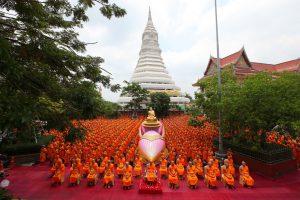International airlines subscribe to a set of standards that call for the airlines to be fined if they allow passengers to arrive in their destination country without proper travel documents.
When you check in at the departure airport, you will need to be carrying travel documents that prove when you intend to leave Thailand – usually in the form of a flight itinerary showing the dates when you’re flying out of the country, or train tickets if that will be your mode of departure. Your airline won’t let you on the plane unless this requirement is met.
Of course, you’ll also need a current passport – one that does not expire until a minimum of 6 months after you are scheduled to return home. Travelers from the US, Canada, UK, Italy, France and Germany who plan to stay 29 days or fewer [see Note 1] can travel to Thailand without a visa. If you want to stay longer than that, or hold a passport from another country, call the Thai consulate in your country to find out what kind of visa you’ll need for your visit. It can take up to 60 days to get some visas, so plan well in advance.
If you change your travel plans after you arrive in Thailand and want to stay longer than 30 days, you can get a 15-day extension – consult a Thai consulate to find out how [see Note 2]. Without an extension or special visa, you risk getting thrown in jail for an overstay. That would happen if during your overstay you were asked for your passport by any government employee (like a police officer). Don’t overstay without an extension.
One key thing thing you need to decide before departure is whether your cellphone will work in Thailand. If you have an unlocked phone with international transmission protocols (GSM), bring your phone from home. If you’re not sure whether your cell phone is locked or it it supports GSM, call your mobile phone supplier. If you don’t have an unlocked mobile phone, you can buy an inexpensive one in Bangkok.
It’s also a essential before you get on your flight to Thailand to print a Google Map with directions from the airport to the place you will be staying. Few Thai cab drivers speak fluent English, but they all read maps.
And one final thing. Take a picture of the first two pages in your passport with your cell phone. If you lose your passport, it will make it easy to replace it. And also, that will make it unnecessary to carry your hardcopy passport with you while you are out and about in Thailand.
[Note 1: The official Thai websites tell travelers they can obtain a 30-day tourist visa at the airport. But what they don’t tell you is that the day you arrive is counted as already having been in the country for one day. If you arrive on Jan. 1 and leave on Jan. 30, you’ll be just fine. But if you leave on Jan 31, the immigration officials will charge you with a fine for one day of overstay (2,000 thb in February 2017). The charge for overstays is subject to change – check Thai visa websites for the latest amount.]
[Note 2: As of December, 2016, if you leave Thailand and stay away for longer than 30 days, you can re-enter the country and start a new 30-day automatic tourist visa period. This can be done a maximum of 3 times in a 6 month period. Thai laws about visa extensions change from time to time, so if you’re thinking of visiting Thailand multiple times in a given 12-month period, contact a Thai consulate in your area for the latest information.]
